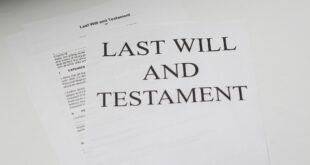Public Trust can help you update your Will
Everyone needs a Will. Life brings little reminders if you aren’t organised as you get older.
“We find it comes into particular focus with our mature clients especially after they attend a few more funerals as they get older,” says Jim McIlroy, Public Trust Estates Manager.
According to Jim Mcllroy, Public Trust (a Crown entity) looks after the interests of more than 200,000 New Zealanders, and writes 11,000 Wills annually.
“Clients come in quite often with a huge degree of apprehension yet they know that they have to get their affairs in order. With a little guidance from us, a huge weight is lifted off their shoulders.”
Remember, a Will is more than an inventory transfer of assets, it is an essential ‘roadmap’ of your last wishes which easily guides those closest to you during a very sensitive time.
So what are some of the common estate planning scenarios when making or updating a Will for those specifically in the latter stages of life?
Single Older Person
A single person can fall either within “the organised” or “the unsure” category. The organised ones have their affairs all in order leaving their entire estate to a charity or perhaps nieces and nephews.
For others, making a Will is a complete challenge. They know they need one but are searching for guidance and suggestions.
Frequently in these situations, Public Trust help identify a potential beneficiary based on an existing connection or provide advice for setting up a trust that earns income for the nominated beneficiary.
Straight Forward & Simple
Parents in marriages or partnerships with adult children and a home close to being freehold usually make simple and straight forward Wills. They are likely to write a Will with no surprises for their family, ensuring their affairs is all in order.
Lifestyle Changes
Lifestyle changes such as divorce, the loss of a partner, guardianship, the birth of more grandchildren or provisioning for a new partner in a remarriage can be important drivers of a Will too.
It’s essential to regularly update a Will to note major changes along with minor changes such as extra gifts bequeathed for grandchildren.
Remember when you get married your previous Will becomes invalid and you will need to make a new one.
In a blended family situation, the writing of a Will is balancing act as it may include specific arrangements involving the children from a first marriage whilst catering to the needs of a second partner and any step children.
Forward Planning
Many parents use a Will to do specific things and forward plan. They may set aside a share in the family estate especially when their own children have been through a marriage or partnership breakup.
Bequeaths
Treasured family heirlooms may be low in monetary value but high in emotional value so passing it on in a Will is a formal and important way of ensuring that the next generation receive the gifts. It can also help avoid painful family arguments once you have passed away.
Funeral Arrangements
Specific funeral instructions beyond burial or cremation preferences such as funeral service suggestions can be noted down in a Will.
Trusts
A Will is important but it’s not the primary way of transferring wealth. Years ago it was perhaps the primary way. Now Public Trust advises seniors about whether a family trust is suitable.
From an estate planning point of view, if a family trust is set up, a new Will needs to be prepared which may transfer assets into the family trust or write off debts owed to the family trust. This is an important step not to be overlooked.
Residential Care Subsidy
The residential care subsidy asset threshold is also a matter to be considered as part of a Will planning process, now that the Government has raised the threshold. If one partner dies, the surviving partner may be subject to the asset threshold. It is a key factor in working out how much older people contribute to the cost of their long-term residential care.
Whatever’s happening in your life now, having an up to date Will can help ensure the people and things that matter most to you are taken care of later on.
Talk to Public Trust about your Will or Enduring Powers of Attorney. For more information click here.











Join the Discussion
Type out your comment here:
You must be logged in to post a comment.